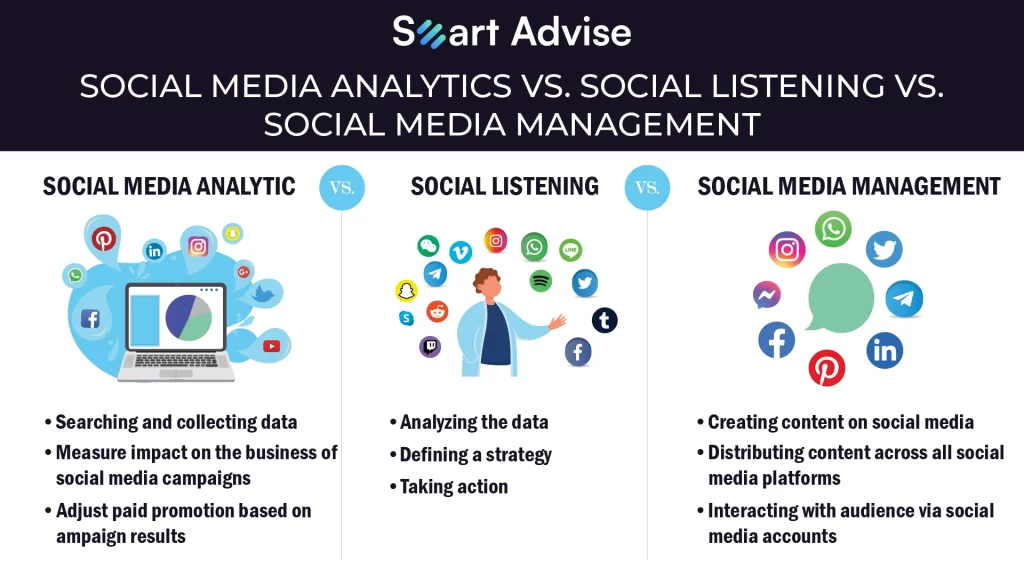
Decode consumer trends and behaviors to shape winning strategies. Maximize business impact with social media analytics
These days, we can’t imagine going about our days without using social media. From individuals sharing their personal moments to businesses engaging with their customers, social media platforms have grown into fast paced dynamic ecosystems that generate vast amounts of data. This wealth of information offers a unique opportunity for businesses to gain valuable insights into consumer behavior, preferences, and trends. Social media analytics tool is an asset for businesses to use data and develop strategies around it.

The Growth of Social Media
Before dealing into the role of social media analytics in business strategies, it’s essential to understand the staggering growth and influence of social media platforms. let’s consider some facts and figures
Global Social Media Users: According to the data from Statista, in 2022, there were approximately 4.59 billion social media users worldwide. These numbers are consistently increasing year by year.
Social Media Penetration: The global social media penetration rate was around 59% in 2023 (Statisa), indicating that more than half of the world’s population was actively using social media platforms.
Social Media Usage: A per Statisa report, in 2022, internet users around the world spent an average of 151 minutes a day on social media, up from 147 minutes the year before.
The Influence of Social Media on Business
With such an extensive user base and a significant portion of daily internet usage dedicated to social media, it’s no surprise that businesses have recognized the need to establish a strong presence on these platforms. The impact of social media on business strategies can be summarized as follows:
Marketing and Promotion : Social media platforms provide an effective channel for businesses to market their products and services. According to HubSpot, 73% of marketers believe that social media marketing has been somewhat effective or very effective for their business.
Customer Engagement: Social media enables businesses to engage directly with their customers, answer queries, and build brand loyalty. An article from Smart insight reported that 63% of customers expect companies to offer customer service through their social media channels.
Brand Awareness: Building brand awareness is a primary goal for many businesses on social media. A study by GlobalWebIndex found that 47% of internet users aged 16-64 follow their favorite brands on social media.
Competitive Analysis: Social media allows businesses to monitor and analyze the activities of their competitors. According to Sprout Social, businesses consider competitive analysis important or very important.
The Role of Social Media Analytics
While businesses recognize the importance of social media, success is not guaranteed by merely having a presence on these platforms. To create effective strategies, companies must utilize social media analytics, which involves collecting, analyzing, and interpreting data from social media platforms. Let’s explore the ways in which social media analytics can be beneficial for businesses:
Understanding the Audience: Social media analytics tools can provide detailed demographic information about a business’s followers, including age, gender, location, and interests. This data allows businesses to tailor their content to the preferences of their audience.
Tracking Engagement: Metrics such as likes, shares, comments, and click-through rates help businesses gauge the effectiveness of their content. Analytics tools can provide insights into which posts perform best and why. This practice helps know if the content is falling right with the audience or not.
Measuring ROI: Social media analytics can track the return on investment (ROI) for marketing campaigns. Businesses can analyze data to see which campaigns generate the most revenue or conversions. The direct and indirect conversion can be seen into the revenues of the businesses, both in the short- and long-term picture.
Monitoring Brand Sentiment: Analyzing mentions and comments related to a brand can reveal the sentiment of the audience. This information is valuable for brand reputation management. These sections also work as an easy feedback space for the consumers, and the brand’s active presence over here definitely helps them build good repo and relationships with the customers.
Competitor Benchmarking: Businesses can use social media analytics to compare their performance with that of competitors. This benchmarking helps identify strengths and weaknesses in their strategies.
Real-Time Insights: Social media is fast paced platform, what’s working now may not work for the next moment, analytics tools can provide real-time data for this, allowing businesses to adapt quickly to trends or crises and make instant decisions.
In Conclusion,
The influence of social media on business is undeniable, and it continues to grow with each passing year with easy internet accessibility across the world. Social media analytics has become an indispensable tool for businesses to understand their audience, track engagement, and shape effective strategies. Connect with us to get more informed knowledge and increase your brand presence across the internet!